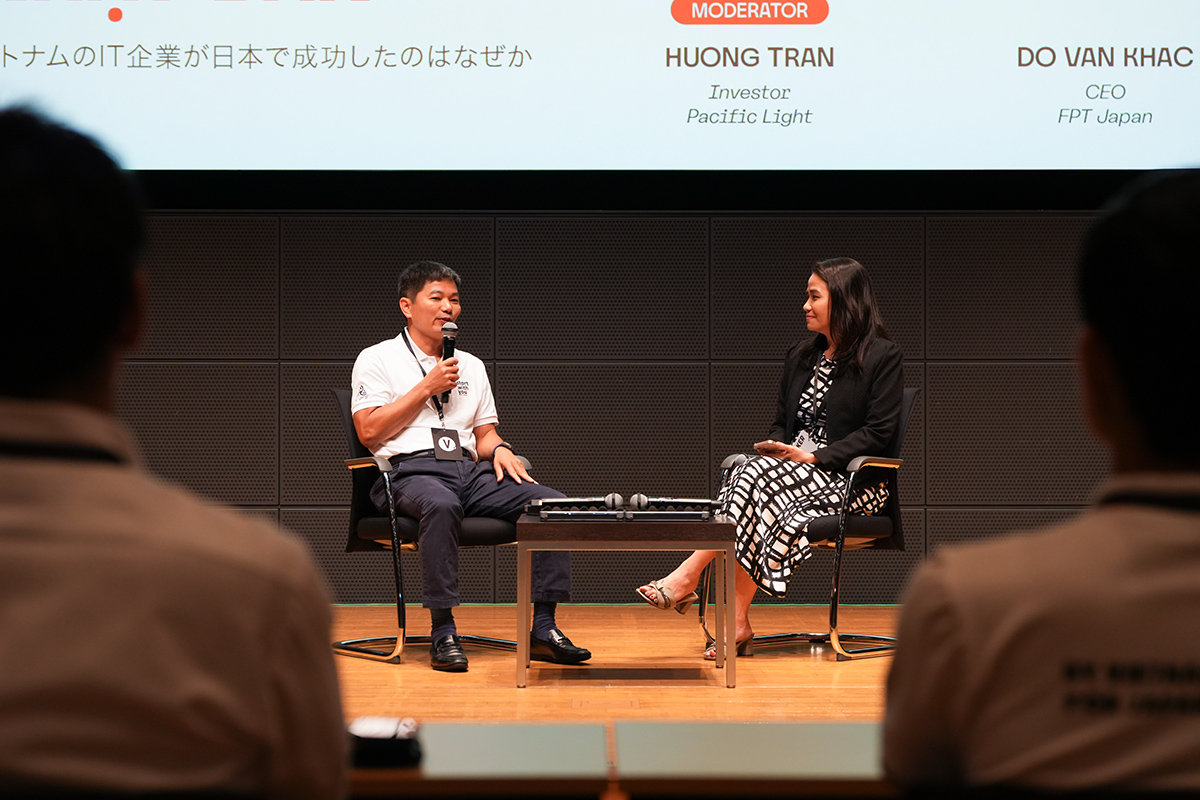Established in 2005, FPT Japan is among the largest Vietnamese IT enterprises in Japan, boasting a diverse workforce of 3,500 across 17 offices.
FPT Japan currently delivers a broad range of services and technological solutions to more than 450 global clients, aiding their digital transformation with strategic consulting and advanced technologies such as AI, machine learning, and cloud computing.
Central to FPT Japan's remarkable success is Mr. Do Van Khac, its CEO. A graduate in Computer Science from the Hanoi University of Science and Technology in 1999, Mr. Do Van Khac joined FPT and has since progressed through over 20 diverse roles. Appointed CEO of FPT Japan at the end of 2022, he has led the company through the pandemic's challenges to its highest-ever growth rate of 50.1% in 2023. Under his leadership, FPT Japan is poised to enter the top 20 IT companies in Japan by 2024.
During the Vietcetera Goes Abroad event in Japan this September, Mr. Do Van Khac participated in the fireside chat session titled "Vietnam Innovator: Making it in Japan." He shared insights about the FPT Japan's nearly two-decade-long journey of establishing a significant presence abroad and discussed opportunities for young Vietnamese and foreign professionals looking to enter this promising job market.

Vision For The Long Haul
Japanese clients are known for their strict standards and demanding expectations. However, Mr. Do Van Khac pointed out the rare and very potential opportunities in working with Japanese IT partners—challenging yet manageable. He explained:
"In Japan, software companies typically segment a project into many smaller phases and outsource them to different vendors. At first, these tasks might seem like a good deal, offering decent profit for less effort. However, this is precisely where the trap lies. If we (FPT Japan) merely content ourselves with completing these segmented tasks, we will stagnate, especially in an era where simple, repetitive tasks are increasingly managed by AI and automated systems.
The real challenge is enhancing our capacity to provide comprehensive, end-to-end services to our clients. This is daunting for IT firms as it demands a broad array of competencies and a strategic vision. Thankfully, FPT is led by visionaries like Mr. Truong Gia Binh - Chairman of FPT Software.
We take cues from leading IT corporations in Japan, setting them as benchmarks for our aspirations. We devise meticulous step-by-step plans, starting with foundational questions such as how Vietnamese professionals can meet Japanese work standards in analysis, product design, consulting, and, importantly, language proficiency."

Investing In Training To Solve The Competence Issue
To address the issues of professional competence and language proficiency, there is no alternative but training. This is a guiding principle for Mr. Do Van Khac and FPT Japan.
He explained, "In Japan, we conduct our own Japanese language training institution called the FPT Japan Academy. Additionally, FPT Japan collaborates with other universities and Japanese language centers to ensure all of our employees at FPT Japan have at least N2 level of proficiency, which is equivalent to business level of Japanese..
Currently, we are training about 13,500 engineers in Japanese, both from Japan and Vietnam. We are also training hundreds as Business Analysts, SAP consultants, and Dynamics 365 specialists."
Thanks to these efforts, FPT Japan now has a ready-to-work, highly-skilled pool of talents who are fully capable of handling complex end-to-end tasks for our clients in Japan.
Opportunities For Young Vietnamese
For the past 15 years, Japan has faced a shrinking population, leading to an estimated shortage of nearly 370,000 IT engineers by 2023, according to the Ministry of Economy, Trade, and Industry (METI). In contrast, an FPT Digital's report on Digital talents development strategy shows that Vietnam trains nearly 400,000 IT engineers and over 50,000 new graduates each year.
Meanwhile, Japan's demand for software outsourcing exceeds $30 billion annually, with Vietnamese firms capturing 6-7% of the market share.

Seizing this opportunity, FPT Japan joined force with other Vietnamese IT firms in Japan to establish the Vietnamese Association of Digital Transformation in Japan (VADX Japan). VADX Japan will host a series of activities aimed at fostering innovation, facilitating technology transfer, research and the application of advanced digital technologies among its members.
With a focus on talent development, VADX Japan is poised to build a worforce of high-quality engineers in Japan and hundreds of thousands of Japanese-speaking engineers in Vietnam, particularly in emerging fields such as cloud computing, big data, AI, and semiconductors.
Reflecting on the efforts of FPT Japan and the current state of the labor market in Japan, Mr. Do Van Khac shared an optimistic view, "Considering the labor shortages in Japan, by studying Japanese, IT, or any field in demand by Japanese society, you'll find opportunities. Currently, about 2,000 Japanese companies are investing in Vietnam, offering further chances to return home after working in Japan."
